The lecture is in honour of Dr. Ben Collen who was a renowned conservation scientist and greatly admired colleague. Ben died in 2018 aged 40.
- Professor Marjo Saastamoinen, University of Helsinki 'Using long-term monitoring data of natural populations to understand responses to anthropogenic change' - 20th March 2023
Abstract
Natural populations and communities are drastically influenced by changes in their environment with habitat loss and climate change being some of the key drivers. It is evident, however, that species and communities are not responding equally to these changes. We thus need a better understanding of the factors and potential (adaptive) mechanisms that determine whether species can mitigate negative impacts of anthropogenic change. Long-term systematic monitoring is a crucial tool to this aim.I will first present some work in the classic model in eco-evolutionary dynamics, the Glanville fritillary butterfly, where we have assessed adaptive responses in relation to both habitat fragmentation and climate change via experimental, genomic and observational approaches. I will then present results in temporal shifts in phenology and spatial shifts in northern range boundaries using long-term monitoring of moths and butterflies in Finland. We relate the observed changes to species-specific traits and population trends over two decades. I will finish my talk with results from two recent studies, where we use multi-taxon approach to assess how species’ positions shift within their climatic niches and compare occupancy patterns between protected and unprotected sites in boreal ecosystems across four decades. Our results show mixed responses across species as well as mixed impacts of protected areas, highlighting that protected areas alone will not suffice to halt the biodiversity crisis and that biodiversity changes at higher latitudes are most prominent. Ultimately, by using long-term monitoring data, we hope to find patterns and identify mechanisms that might contribute to help threatened populations and communities under anthropogenic pressures.
- Professor Zoe Davies, DICE, University of Kent 'Getting a Wellbeing ‘Boost’ from Biodiversity' - 29th June 2022
Abstract
Global phenomena, such as urbanisation, agricultural intensification and biotic homogenisation, have led to extensive ecosystem degradation and species extinctions. Against this backdrop of biodiversity decline, researchers, policy-makers and practitioners are all emphasising the human wellbeing gains that can be realised when people interact with nature. Indeed, there is now compelling evidence showing that the potential personal and societal benefits are diverse, from stress-relief and reduced mental fatigue, through to improved physical health and greater social cohesion. However, we still do not know what role biodiversity plays in these accepted truths. Those tasked with planning and managing our human-dominated landscapes must deliver, and trade-off between, multiple biodiversity, individual and societal objectives. Nonetheless, we cannot optimise the outcomes for both people and conservation until we understand how biodiversity underpins wellbeing. In this talk, I will explore the complexities associated with maximising the wellbeing boost people can get from biodiversity.
- Professor Derek Tittensor, Dalhousie University, Novis Scotia, Canada 'Marine Ecosystems Under Climate Change' - 07th June 2021
Abstract
Marine ecosystems, like their terrestrial counterparts, are already experiencing the accelerating threat of climate change. Layered atop other human impacts, it will reconfigure everything from where organisms can exist to how they interact and the benefits that they provide to society. In this talk, I describe how my research aims to project, describe, and explore how to adapt to these ongoing changes, by examining biological responses from the individual to the global, and by applying a variety of modelling and other approaches. Ultimately, the impacts of a changing marine environment will be borne by all – but they will be inequitably distributed. How can we deal with these interlaced biological and human dimensions? I don’t pretend to have all of the answers, but these are topical questions centred around an enormous societal challenge.
- Professor Julia P G Jones, Bangor University 'Does Conservation Work and How Do We Know' - 02nd March 2020
Abstract
The 2019 Nobel Prize for economics was won by Banerjee, Duflo and Kramer for their experimental approach to alleviating poverty. While the trio are considered heroes by many, their use of Randomized Control Trials to evaluate the impact of development interventions has been controversial. Conservation scientists are increasingly aware of the urgent need for better evidence of what works and what doesn’t, but experimental evaluation of the effectiveness of conservation interventions at the landscape scale remain rare. Using the example of a Randomized Control Trial of a Payment for Ecosystem Services scheme in the Bolivian Andes, I will illustrate some of the pros and cons of experimental evaluation in the complex socio-ecological context in which many conservation interventions are implemented. I will highlight that while randomization holds many advantages and we could be doing more, it is not practical or desirable for many common interventions (can you imagine randomizing the allocation of protected areas in a landscape?). I will show that robust statistical methods, ideally in combination with publication of pre-analysis plans, will be the best approach in many conservation contexts. The ultimate desire is that conservation science can avoid the acrimonious debate which has plagued the use of Randomized Control Trials in the field of poverty alleviation, and take a pragmatic approach to improving our understanding of what works in conservation.YouTube Widget Placeholderhttps://www.youtube.com/watch?v=6X_n7U54ZOk 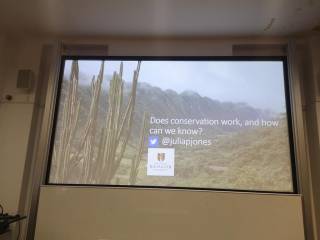
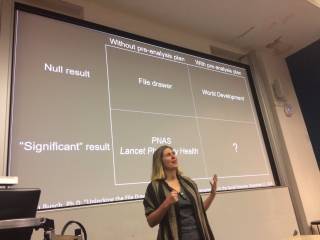
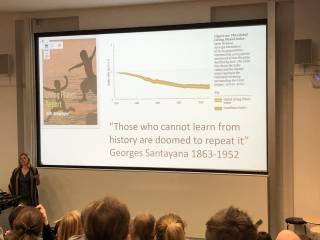
- Professor Rob Ewers, Imperial College London 'Rainforest Futures' - 04th March 2019
Abstract
Tropical rainforests are “more complex than the space station and more connected than the internet.” Yet they are under threat. Roughly one half of the world’s forests have been logged and agricultural expansion is rapidly pushing back forest frontiers. Understanding and predicting the fate of the many thousands of species in these remarkable habitats represents one of ecology’s greatest challenges.New research is finding that damaged rainforests retain remarkable stores of biodiversity, and that biodiversity underpins the sustainability of agricultural landscapes such as oil palm plantations. Degraded forests are also surprisingly resilient ecosystems, but that resilience comes at a cost. Insects are losing their dominant position in the web of life, and time lags between human actions and their ecosystem consequences mean that our actions and choices today will resonate for decades to come.
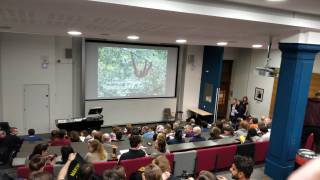
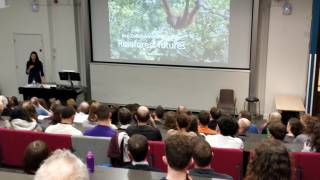
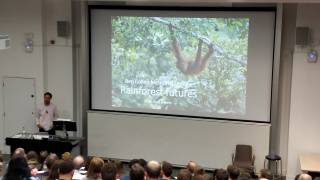
 Close
Close

